Lea Wait's Blog, page 110
June 7, 2021
Better Homes & Gardens
“If you have a garden and a library, you have everything you need.” – Marcus Tullius Cicero
Clay tablets. Papyrus scrolls. The earliest libraries of ancient civilizations were governmental, dedicated to business inventories, state record keeping, and also housed some knowledge relating to history, science, astronomy, and philosophy. (You can tell I looked up the history of libraries on Wikipedia.) It wasn’t until the 5th century BC that private or personal libraries consisting of written books became popular in Greece.
Nowadays, one might collect Ferraris or Fabergé eggs to demonstrate one’s wealth. Back then, rich old Greeks wishing to impress would buy and display books that they never read and never would read. Seneca complained, “Now, like bathrooms and hot water, a library is got up as standard equipment for a fine house.” It was just window-dressing, books by the yard.
I expect we think of bathrooms and hot water as slightly more necessary than books, even if we are rabid readers. But when our basic needs are taken care of, Cicero is right. There’s a wonderful wall of books in my living room, two closets with shelves lined with books, and several unopened boxes of books in storage. I’ve probably given away, donated, and sold more books than I still possess, since we’ve moved quite a bit and I don’t usually re-read. At the moment, there are hundreds of unread books on my Kindle. Does that stop me from 1-Clicking? I’m afraid not. At least that electronic TBR pile won’t topple over and kill me. I’ll never be bored, if I remember to charge the device.
However, I’m really here to talk about my garden. Writing and gardening have something in common—you are never truly done. Even after a book is in print, I can see opportunities I missed. A more succulent word could have been added here. A plot point there should have been more fully explored. And as I sit at my desk, the weeds are not at all respectful of my advanced age. It’s like having perpetual homework hanging over your head, no matter if you graduated long, long ago.
When I’m writing, I think I should be outside. When I’m outside, I feel like I’m cheating on my manuscript. If only I could clone myself, or manage my time better, those problems would be solved.
We moved into this house almost two years ago, and one of its selling features was its small three-tiered, park-like fenced garden, with exquisite stonework and numerous perennial shrubs and flowers. There’s a pond with a rock fountain, a sun terrace, a hammock, a fire pit, a hot tub. Really, you never have to leave home to go on vacation.

However, it isn’t maintenance free. I’ve been pretty stubborn this spring, trying to do mostly everything myself with the occasional help of my 13-year-old granddaughter and her friends. One Saturday my oldest daughter and her husband came and bagged up eleventy-billion leaves. Another daughter cut back the roses and tree hydrangeas. My husband bought a leaf vacuum, and roars around the yard. Sadly, my garden guy moved to New Mexico last December, though the 200 spent purple tulips he planted for me last fall that I now should trim remind me of him every day. Much as I hate to admit it, I need some professional help.

But life is good. I have books to read, books to write, and a garden. And two working bathrooms! Cicero and Seneca would approve.
Green thumb? Black thumb? How does your garden grow? What’s your TBR pile like?
“You can bury any number of headaches in a garden.” – Charles Barnard
Maggie Robinson has written over twenty historical mysteries and romances. Her latest series, the 1920s-set Lady Adelaide Mysteries, features a widowed marquess’s daughter, and Anglo-Indian Scotland Yard detective, and the pesky ghost of her late and unlamented husband. The fourth and final book, Farewell Blues, releases in September.
June 4, 2021
Weekend Update: June 5-6, 2021
 Next week at Maine Crime Writers there will be posts by Maggie Robinson (Monday), John Clark (Tuesday), Joe Souza (Thursday) and Susan Vaughan (Friday). Some Wednesdays from now on will be “Win a Book Wednesday” with giveaways, drawings, and announcements of winners. Be sure to stop by at mid-week to see what’s new.
Next week at Maine Crime Writers there will be posts by Maggie Robinson (Monday), John Clark (Tuesday), Joe Souza (Thursday) and Susan Vaughan (Friday). Some Wednesdays from now on will be “Win a Book Wednesday” with giveaways, drawings, and announcements of winners. Be sure to stop by at mid-week to see what’s new.
In the news department, here’s what’s happening with some of us who blog regularly at Maine Crime Writers:
Maine Crime Writers Vaughn Hardaker and Maureen Milliken will be reading at a special virtual Noir at the Bar Saturday night, beginning at 7 p.m. Maine Crime Writer Brenda Buchanan will be the excellent moderator. Each author will read for five minutes, so be sure to have the wine bottle nearby so you don’t miss anything! This is an event of Maine Crime Wave, but you don’t have to have registered for Crime Wave to tune in and join the fun. Click here to get the link to attend. Besides Vaughn, Maureen and Brenda, other writers taking part are Tess Gerritsen, Rob Kelley, Jule Selbo, Alexia Gordon, Janet Murch, Jim Ziskin and Emily Bernhard.
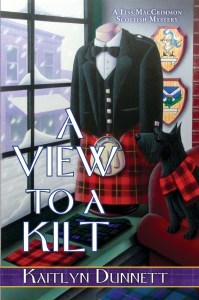 from Kaitlyn Dunnett: For the month of June, the e-book of the most recent Liss MacCrimmon mystery, A View to a Kilt, will be on sale for $1.99. In this one, Liss finds a body, literally, in her own back yard. The Scotties also make an appearance. For a quick link to e-book outlets, you can click here: https://www.kensingtonbooks.com/9781496712677/a-view-to-a-kilt/
from Kaitlyn Dunnett: For the month of June, the e-book of the most recent Liss MacCrimmon mystery, A View to a Kilt, will be on sale for $1.99. In this one, Liss finds a body, literally, in her own back yard. The Scotties also make an appearance. For a quick link to e-book outlets, you can click here: https://www.kensingtonbooks.com/9781496712677/a-view-to-a-kilt/
A final reminder, as time is running out: don’t forget to snap those photos so you can win our “Where Would You Put the Body?” contest. Entry information here:
‘Where Would You Put the Body Contest’
How do you enter? Send a photograph of your chosen spot to:WritingAboutCrime@gmail.com with “Where Would You Put the Body?” in the subject line and the photo’s location in the body of the email. There will be prizes for First, Second, and Third place–books of course and other Maine goodies. Maybe a Duck of Justice tee shirt? You may enter no more than three photographs, each one entered separately. They must be of Maine places and you must identify the place in your submission. Photos must be the submitter’s original work. Contest will begin May 1st and will run through June 15th.
The winners for the Win a Book Wednesday offering of Katharine Clark’s Steal Away are L.C. Rooney and Julianne Spreng. Please send your snail mail address to: writingaboutcrime@gmail.com so we can mail you the book. Thanks to all our commenters and stay tuned for more Wednesday giveaways.
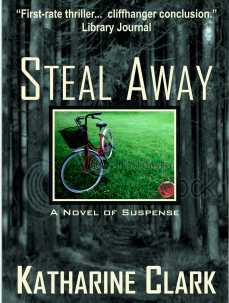
An invitation to readers of this blog: Do you have news relating to Maine, Crime, or Writing? We’d love to hear from you. Just comment below to share.
And a reminder: If your library, school, or organization is looking for a speaker, we are often available to talk about the writing process, research, where we get our ideas, and other mysteries of the business. We also do programs on Zoom. Contact Kate Flora
June 3, 2021
So, What Cha’ Doing This Weekend?
A bevy of top-notch crime writers will be in Maine this weekend and we writers and readers of crime fiction get to hang out with them. Virtually, that is.
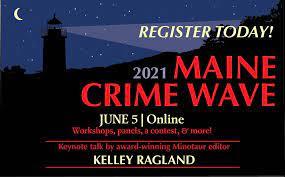
Maine Crime Wave is tomorrow. It’s happening on Zoom, and as much as we all wish we could be together in person this year, there are distinct advantages to an online conference:
You won’t have to drive into Portland, which is a relief, because the whole city is a giant road construction zone right now.Given that the forecast is for a spectacular early summer day, it will be perfectly fine to participate from a chaise lounge on the deck.Thanks to the miracle of technology, there’ll be opportunities to schmooze (and buy books!) between events.At 9 a.m, five powerhouse authors will be talking about building their protagonists.
MCW alum Barbara Ross, author of the wonderful Maine Clambake Mysteries, will moderate the discussion among Lou Berney, who has won every crime writing award ever invented for The Long and Faraway Gone and November Road, Maine’s own Paul Doiron, whose 12th (!) Mike Bowditch novel Dead by Dawn will be released not soon enough in my opinion, New York Times bestselling romantic suspense author Carla Neggers, known especially for her Sharpe & Donovan series, former police officer Isabella Maldonado, whose new series featuring FBI special agent Nina Guerrera is drawing raves, and the fabulous Tess Gerritsen, who lights the path for so many of us with her medical mysteries, Rizzoli and Isles series and recent foray into supernatural thrillers.
At 11 a.m., MCW author Richard Cass, author of the marvelous Elder Darrow series of jazz mysteries, will entice five other superb writers to talk about their top plot secrets.
Jess Lourey, author of award-winning adult mystery novels (Unspeakable Things – wow!) and YA adventure books, will be there. So will NY Times bestseller Michael Koryta (who sets some of his super suspenseful books in Maine), Portland’s own Chris Holm (author of the multi-award-winning Michael Hendricks thrillers and the eagerly anticipated Child Zero), Alexia Gordon (if you haven’t read her Gethsemane Brown series, start with Murder In G Major and trust me, you’ll keep on going) and James Ziskin, whose short story The Twenty Five Year Engagement and most recent Ellie Stone novel Turn To Stone have been nominated for a slew of big awards this year.
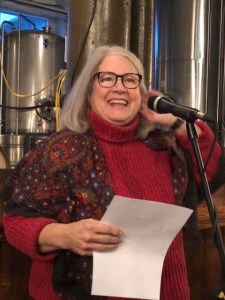
The inimitable Julia Spencer-Fleming
After lunch, Kelley Ragland, Vice President/Associate Publisher/Editorial Director for Minotaur Books will give a keynote address after being introduced by our own Julia Spencer-Fleming.
But as they say on those TV commercials for Flowbee hair trimmers, wait, there’s more!
hair trimmers, wait, there’s more!
At 7 p.m., I get to host a virtual Noir @ The Bar with three of the above-mentioned authors (Tess Gerrisen, Alexia Gordon and Jim Ziskin) and six other fine local writers: Robert Kelley (defending champion of the annual Two Minutes in the Slammer event); Maureen Milliken (author of the Bernie O’Dea series); 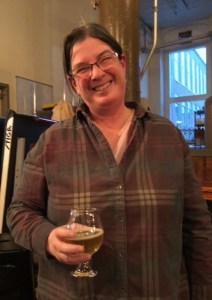 Jule Selbo (recently relocated screenwriter whose debut novel 10 Days will be out in August); two-time Maine Literary Award finalist Vaughn Hardacker; Stonecoast MFA standout Emily Bernhard and Janet Murch, winner of the 2019 Crime Wave Flash Fiction Award.
Jule Selbo (recently relocated screenwriter whose debut novel 10 Days will be out in August); two-time Maine Literary Award finalist Vaughn Hardacker; Stonecoast MFA standout Emily Bernhard and Janet Murch, winner of the 2019 Crime Wave Flash Fiction Award.
Each writer will read a five-minute scene. You can pour yourself whatever you prefer to drink.
You don’t need to be a Crime Wave registrant to tune in. This Crime Wave Noir@The Bar is FREE and it will be fun. I hope to see lots of you in the virtual audience.
Here’s the RSVP link, which will get you a special super secret link to Noir@The Bar itself: https://www.mainewriters.org/events/noirbar
Saturday night at 7 p.m. Join us!
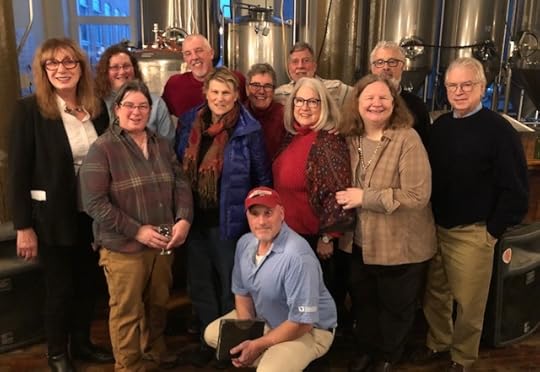
Many of the Maine Crime Writing family at an in-person Noir@The Bar held live at Banded Brewing in Biddeford.
Copycat Kate Looks Back at Maine Summer Jobs
Kate Flora: Hanging on Kaitlyn Dunnett’s coattails, I woke up this morning thinking about Maine summer past, and some of the jobs that I had. As many readers know, I grew up in Union (on Route 17 between Rockland/Camden and Augusta) on a chicken farm. Agriculture is very much an up and down thing, with good years and bad years, and it was always clear that if I wanted new school clothes, I was expected to work in the summer.
about Maine summer past, and some of the jobs that I had. As many readers know, I grew up in Union (on Route 17 between Rockland/Camden and Augusta) on a chicken farm. Agriculture is very much an up and down thing, with good years and bad years, and it was always clear that if I wanted new school clothes, I was expected to work in the summer.
At twelve and thirteen, the summer job was raking blueberries. We all raked blueberries. I remember my mother driving me down to the town center, which we called “the village” where we would climb on a truck and be driven to that day’s field. We’d rake the berries into baskets, then carry them to the winnowing machine, and get a check on the little card that kept track of how many baskets we’d raked. I used part of my earnings to buy a small transistor radio that got the best reception on a burner on the kitchen stove. Once my father turned on the burner, and ever after, the smart brown case had brown, burner-shaped scorch marks on the bottom.
When I look back, it seems like there must have been an awful lot of summers once I was old enough to work off the farm. The summer I turned fifteen, my friend Karin and I worked as cook’s helpers at the Pemaquid Seminars, a summer writing program located on the shores of a lake. When I had my birthday, they were shocked to learn I’d only been fourteen. The writers were thrilled when I made them all homemade bread, part of my 4-H training. Of course I’d grown up in a household where we made all of our own bread, and my mother was always developing recipes for her magazine articles.
In the downtime, we listened to Bill Cosby records. Once a week we paddled equipment and food down the lake and set up for a lobster bake on the shore. It was a summer of revelations, the first time I’d lived away from home. The cook, Mrs. Moulder, was southern–something new to this small town girl. Once a week (as I remember it) we would go to see plays–Hedda Gabbler, A Thousand Clowns, and others, at the local summer theater, which must have been the Pemaquid Playhouse..
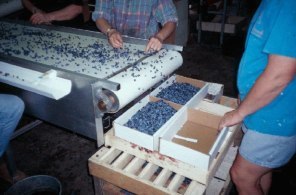
Blueberries coming off the belt
One summer I took courses at the University of Maine, in a program for talented high school juniors. Lived in a dorm, learned the ways of a college campus, took courses with college students, and contemplated skipping my senior year. Another summer, unless it was the same one, I graduated from raking blueberries to working in the processing plant. It entailed sitting for hours along a conveyer belt as blueberries rolled past, and it was our job to pick out the leaves, and clumps of dirt and sticks and spiders and bugs and bees and the occasional mouse. Again, it was agriculture, and if there was a large harvest that day, we stayed until late in the night, until all the berries were processed. There were no cell phones, of course, so I imagine those of us who didn’t have our own cars had to use the phone to call our parents to come and pick us up.
The summer before college, I worked as a chambermaid in Camden at The Whitehall Inn. At that time, it was a place where many of the guests returned every year for a week or more, while other guests had just come off a week sailing the coast of Maine on schooners. Again I lived away from home, walking back to where I was staying with one of my high school teacher’s families. I know that in August we did a staff show for the guests, and have vague memories of wearing a white nightgown, carrying a candle, and singing a song from “The Sound of Music.”
The next year, it was being upstairs-downstairs maid for an eccentric millionaire’s family
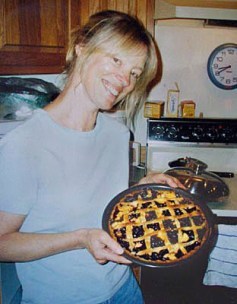
Pie from my Union blueberries.
out on Islesboro. They were very particular about how the house was kept, and we carried Brasso to keep things shiny, and an iron to smooth the sheets when we made the beds. The family had a number of untrained dogs and part of the job was constantly cleaning up after them before the lady of the house stepped in dog poo as she swanned about the place. That summer included my making a wedding dress for one of the other girls who worked there, taking the ferry back to compete for Maine blueberry queen, and my very first hangover.
Summer in Maine. Just thinking about it brings back so many memories. Even before I had jobs, there was always food to process, and a houseful of guests who’d come to Maine to escape the city heat. Many summer nights, we sat at the kitchen table and processed food that would be frozen or canned for what was always called “the long, cold winter.” It was a life so connected to the land and the seasons, and one quite unlike the childhoods of most of the people I later met at college and on my jobs.

June 2, 2021
Mystery and TV Tropes for Writers
Today our friends at Mainely Murders open for the season. https://mainelymurders.com
A reminder that you can still enter last week’s Win a Book Wednesday by leaving a comment here. Winners will be announced in our weekend update. And while we aren’t offering a book this week, we’re sharing something you may find a lot of fun.
Which of these drive you crazy as a reader, and what would you add to the list?
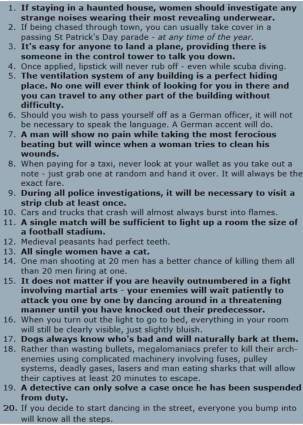
May 31, 2021
Summer Jobs
Kaitlyn Dunnett/Kathy Lynn Emerson here, today reminiscing about summer jobs. It’s that time of year, isn’t it, when high school students are thinking about how to earn money during their summer vacation? Whether it’s to buy that first car or to save for college, teenagers still look for work to meet their goals.
Back in the dark ages when I was growing up, most of us started early when it came to earning our own money. Whether we had an allowance tied to doing chores around the house or an outside job, the “work ethic” was drummed into us. If you agreed to take on the responsibility, you carried out your obligations to the best of your ability. Complaining might be allowed, but there was no quitting until the job was done.
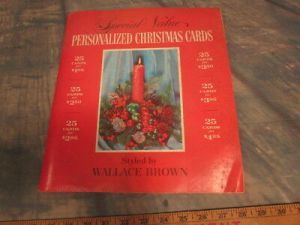 My first “job” was helping my mother sell Christmas cards. In the 1950s, many people ordered their cards, with their names printed on them, months in advance. In addition to her regular job as a beautician, Mom carted around heavy sample books from three Christmas card companies—Wallace Brown, Marion Heath, and Tom-Wat—taking them into people’s homes so they could make their selections. [And aside: she sold Tom-Wat cards because that business was founded by my cousin’s husband. They were and are more famous for fundraising kits.] Eventually, she turned the business over to me. I couldn’t have been more than twelve, but I remember sitting patiently in various living rooms while customers paged through the offerings and then writing up their orders. I don’t remember all my customers, but I do recall that they included Dr. Vornos, my physician’s wife and partner, and Mrs. Stickle, who was married to the owner of the drugstore we patronized.
My first “job” was helping my mother sell Christmas cards. In the 1950s, many people ordered their cards, with their names printed on them, months in advance. In addition to her regular job as a beautician, Mom carted around heavy sample books from three Christmas card companies—Wallace Brown, Marion Heath, and Tom-Wat—taking them into people’s homes so they could make their selections. [And aside: she sold Tom-Wat cards because that business was founded by my cousin’s husband. They were and are more famous for fundraising kits.] Eventually, she turned the business over to me. I couldn’t have been more than twelve, but I remember sitting patiently in various living rooms while customers paged through the offerings and then writing up their orders. I don’t remember all my customers, but I do recall that they included Dr. Vornos, my physician’s wife and partner, and Mrs. Stickle, who was married to the owner of the drugstore we patronized.
When I got a little older, I was roped into a traditional girls’ job. Babysitting was not my thing. I didn’t even care for it when my charges were asleep and didn’t need entertaining. I do recall getting a kick out of taking a close look at my employers’ possessions while they were out. I didn’t touch anything except the occasional book or LP, but I enjoyed being able to snoop, especially when I was babysitting for one of my teachers.
 There’s a pattern to most of my early jobs, including the first “real” one—my parents were the ones who arranged them for me. The summer between junior and senior years in high school, I went to work as a long-distance operator for the local telephone company. A lot of my friends worked there, too, using the kind of “cord board” that, these days, you only see in old black-and-white movies. When someone wanted to make a call, a light would come on over their number. That meant we knew who was calling out. We were supposed to stick one cord into the hole and say “Long Distance,” (local operators said “Number, Please”) but there was one number, belonging to a local businessman, that no one wanted to deal with. It’s no surprise he complained, among other things, about slow service!
There’s a pattern to most of my early jobs, including the first “real” one—my parents were the ones who arranged them for me. The summer between junior and senior years in high school, I went to work as a long-distance operator for the local telephone company. A lot of my friends worked there, too, using the kind of “cord board” that, these days, you only see in old black-and-white movies. When someone wanted to make a call, a light would come on over their number. That meant we knew who was calling out. We were supposed to stick one cord into the hole and say “Long Distance,” (local operators said “Number, Please”) but there was one number, belonging to a local businessman, that no one wanted to deal with. It’s no surprise he complained, among other things, about slow service!
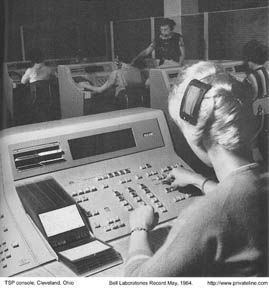 By the next summer, that office had closed down and all operations had been moved to a neighboring town. Instead of a cord board, we had brand new TSP machines to handle calls—early computers, if you will. I don’t think anyone could dial a number from home yet, although that must have come soon after, but they definitely still needed an operator for long distance. The job paid well, and paid better if I worked split shifts or at night. A family friend was persuaded to provide transportation and probably had something to do with arranging my schedule, too. The money was nice, but I suspect I missed out on a lot during that summer after high school graduation. At the time, it never occurred to me to question the choice of jobs, or suggest that I might be happier working closer to home, even though my best friend, who had worked for the phone company the year before, had a job at the local Woolworth’s and much more free time than I did.
By the next summer, that office had closed down and all operations had been moved to a neighboring town. Instead of a cord board, we had brand new TSP machines to handle calls—early computers, if you will. I don’t think anyone could dial a number from home yet, although that must have come soon after, but they definitely still needed an operator for long distance. The job paid well, and paid better if I worked split shifts or at night. A family friend was persuaded to provide transportation and probably had something to do with arranging my schedule, too. The money was nice, but I suspect I missed out on a lot during that summer after high school graduation. At the time, it never occurred to me to question the choice of jobs, or suggest that I might be happier working closer to home, even though my best friend, who had worked for the phone company the year before, had a job at the local Woolworth’s and much more free time than I did.
Two things happened before the next summer. I started college in another state and my parents moved to a new town. For the first time, in April of 1966, I went job hunting. I had an advantage, Thanks to the tri-semester schedule at my college, I had almost four full months off. Although my mother went with me to apply, I got my next job, as a deli clerk at the local A&P, all by myself.
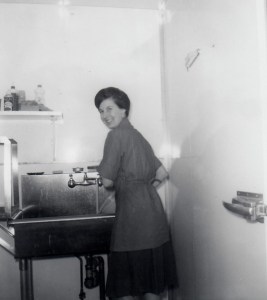 That was a great summer. I started out not knowing anyone, but a lot of seniors from the local high school also worked at the A&P and several of them became good friends. Let’s just say I didn’t spend much time at home. The term “party hearty” comes to mind.
That was a great summer. I started out not knowing anyone, but a lot of seniors from the local high school also worked at the A&P and several of them became good friends. Let’s just say I didn’t spend much time at home. The term “party hearty” comes to mind.
For some reason, probably to do with how much more the job paid, I let my father convince me to work at a local bank the next two summers. In those days, that meant spending a lot of time sorting paper checks and posting data into what were essentially primitive computers. It was the most boring job I ever held. I worked in a back room with no windows and was by far the youngest person there. Although I was still in touch with some of the friends I’d made the summer before, there wasn’t nearly as much socializing. When my mom had to have surgery the second summer, I generously offered to quit my job to take care of her. My father wouldn’t hear of it. That darned “work ethic” thing again! I’d made a commitment and I was expected to keep it.
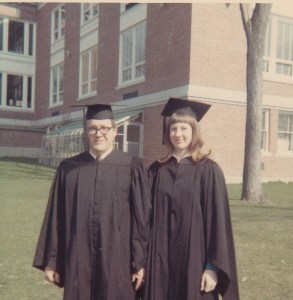 By the next summer, I was married (two weeks after college graduation). Unfortunately, although I had hope of a teaching job in the fall, I didn’t have any job lined up for the summer and my new husband was in imminent danger of being drafted. After a brief stint going door-to-door to hand out samples of a new detergent, I got smart, left my college degree off my resume, and landed a job based on other qualifications. I spent the summer working as a switchboard operator/bookkeeper at one of the local shoe factories.
By the next summer, I was married (two weeks after college graduation). Unfortunately, although I had hope of a teaching job in the fall, I didn’t have any job lined up for the summer and my new husband was in imminent danger of being drafted. After a brief stint going door-to-door to hand out samples of a new detergent, I got smart, left my college degree off my resume, and landed a job based on other qualifications. I spent the summer working as a switchboard operator/bookkeeper at one of the local shoe factories.
At least the office was air conditioned.
Readers: What summer jobs did you hold? Did you stick with one you hated, or rebel and find one you liked better?

Kathy Lynn Emerson/Kaitlyn Dunnett has had sixty-three books traditionally published and has self published several children’s books and three works of nonfiction. She won the Agatha Award and was an Anthony and Macavity finalist for best mystery nonfiction of 2008 for How to Write Killer Historical Mysteries and was an Agatha Award finalist in 2015 in the best mystery short story category. She was the Malice Domestic Guest of Honor in 2014. Her next publication (as Kaitlyn) is the fourth book in the contemporary “Deadly Edits” series (Murder, She Edited), in stores in August 2021. As Kathy, her most recent novel is a standalone historical mystery, The Finder of Lost Things. She maintains websites at www.KaitlynDunnett.com and www.KathyLynnEmerson.com. A third, at A Who’s Who of Tudor Women, is the gateway to over 2300 mini-biographies of sixteenth-century Englishwomen, now available in e-book format.
May 28, 2021
Weekend Update: May 29-30, 2021
 Next week at Maine Crime Writers there will be posts by Kaitlyn Dunnett/Kathy Lynn Emerson (Tuesday), Kate Flora (Thursday) and Brenda Buchanan (Friday) Monday is Memorial Day. Some Wednesdays from now on will be “Win a Book Wednesday” with giveaways, drawings, and announcements of winners. Be sure to stop by at mid-week to see what’s new.
Next week at Maine Crime Writers there will be posts by Kaitlyn Dunnett/Kathy Lynn Emerson (Tuesday), Kate Flora (Thursday) and Brenda Buchanan (Friday) Monday is Memorial Day. Some Wednesdays from now on will be “Win a Book Wednesday” with giveaways, drawings, and announcements of winners. Be sure to stop by at mid-week to see what’s new.
In the news department, here’s what’s happening with some of us who blog regularly at Maine Crime Writers:
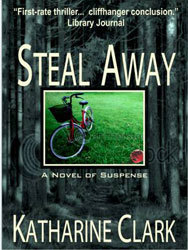 A reminder to leave a comment, here or on the Wednesday page, to be eligible to win a copy of Steal Away. https://mainecrimewriters.com/2021/05/26/its-win-a-book-wednesday/
A reminder to leave a comment, here or on the Wednesday page, to be eligible to win a copy of Steal Away. https://mainecrimewriters.com/2021/05/26/its-win-a-book-wednesday/
And don’t forget to snap those photos so you can win our “Where Would You Put the Body?” contest. Entry information here:
‘Where Would You Put the Body Contest’
How do you enter? Send a photograph of your chosen spot to:WritingAboutCrime@gmail.comwith “Where Would You Put the Body?” in the subject line and the photo’s location in the body of the email. There will be prizes for First, Second, and Third place–books of course and other Maine goodies. You may enter no more than three photographs, each one entered separately. They must be of Maine places and you must identify the place in your submission. Photos must be the submitter’s original work. Contest will begin May 1st and will run through June 15th.
An invitation to readers of this blog: Do you have news relating to Maine, Crime, or Writing? We’d love to hear from you. Just comment below to share.
And a reminder: If your library, school, or organization is looking for a speaker, we are often available to talk about the writing process, research, where we get our ideas, and other mysteries of the business. We also do programs on Zoom. Contact Kate Flora
My Flash Entry in the Maine Crime Wave Contest
John Clark, nursing a fractured elbow from a Saturday afternoon project that went awry, more about that in a later post. My entry in this years Maine Crime Wave challenge was among the ten best, per the email I received, so I wanted to share it here.

I hesitated, should I run out and retrieve it, or keep on my daily walk? Curiosity won and I dashed out, bending over to grab it as a taxi whizzed by so close it nearly flattened me. The driver honked and waved. I waved back, using my whole hand.
It started drizzling, leaving me no time to examine my find. I looked up at the building. Twenty-one stories meant finding the bill’s owner would be like the proverbial needle in a haystack, especially since the Uber, or Lyft driver was long gone.
By the time I was back at my condo, the rain was pounding on the sidewalk and I was thankful I’d worn my waterproof topcoat. After starting a fresh pot of coffee and changing into dry pants, I took the bill out of my pocket, only to discover I’d retrieved a horse of another color. At first glance, it did look like a Benjamin, but upon closer examination, I realized it was a bill from a therapist for exactly one hundred bucks.
It wasn’t the person being billed that caught my eye, but the therapy agency and the service provided. I took a deep breath and poured a cup of coffee before thinking things through.
Grief Alleviation Associates was the agency doing the billing and it was for something they called sibling suicide and loss therapy. That was sad in and of itself, but the red PAST DUE stamped across the bottom made my gut wrench.
I thought back to my childhood sixty years before. I grew up dirt poor at a time when personal loss wasn’t talked about. When my mother died, it was one of the things that pulled me into a bottle, not letting me out until I stumbled, reeking of desperation, into my first AA meeting when I was thirty-five.
What had been the equivalent of a hundred bucks when I was a kid, five, ten? Who knew. We hardly ever saw anything bigger than a quarter. If my older brother and I hadn’t been good shots and unafraid of getting caught, the venison that kept us from starving would never have made the supper table.
I closed my eyes and meditated for a while, letting various messages and things said at meetings flow through my mind. One kept returning, something Albie J said at almost every meeting. “Don’t forget to do the next right thing.”
I went to my desk, grabbed a stamped envelope and my checkbook, then wrote out a check for the hundred with ‘next right thing’ on the memo line. After addressing it to the agency, I put the woman’s name and address at the top and sealed it. I’d sleep well tonight.
May 26, 2021
My town’s Geraldo Rivera Al Capone’s safe moment… almost
There was a little extra added excitement this year as my town prepared for the Memorial Day commemoration. It had recently been discovered that, screwed into the back of our veterans monument, was a time capsule. It was put there in 1987, and was supposed to be opened in 2000.
Apparently, we were told in a town email blast last week, the town missed the deadline.

My town’s veterans monument. Time capsule is around the back.
There was a lot of speculation as people met, vaxxed and ready for some fun, at the bakery and local store about what could be in the time capsule. The speculation was hedged, though, with low expectations, because, after all, 1987 wasn’t really that long ago. And it was supposed to be opened in 2000? Would everything really have changed so much in 13 years that the items would be that interesting? Hell, in 2000 I was still wearing clothes I’d bought in 1987. Hell, there were even coffee stains and crumbs on my clothes in 2000 that got there in 1987.
But still, it was something. After the Memorial Day service at the cemetery, the party would move down to the village. The time time capsule would be unscrewed from the back of the monument and brought across the street to the Village Green, where it would be opened in a time-capsule-opening ceremony.
I was even going to be there, camera in hand, to document the moment for the town newsletter, which I’m putting together this weekend and planned to save a spot for.
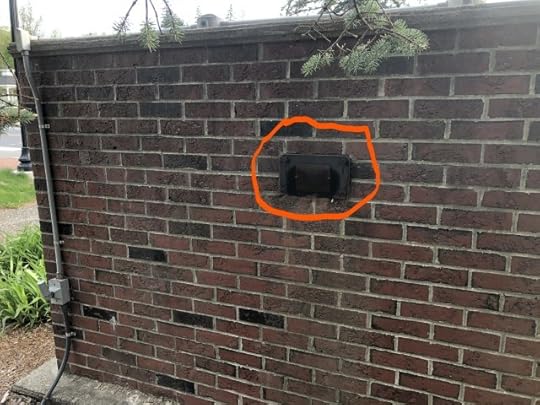
Time capsule (circled) attached to the back of the town veterans memorial.
You may be thinking this sounds like the opening chapter of a cozy mystery that’s trying a little too hard. Folks, towns like mine are where plots for cozy mysteries are born. I can assure you, this is pure nonfiction.
Then, this morning, another email blast from the town office landed in my inbox. It had the disheartening subject line “Time capsule opening canceled.” No unnecessary capitalization. No overdone punctuation. No bolding and italics.
Something was obviously very wrong.
If you’re of a certain age, you may remember the hoopla around TV personality Geraldo Rivera’s televised opening of Al Capone’s safe in 1986. If memory serves, there was a lot of hype and speculation leading up to it. Everyone watched it on TV. (Yes, it was simpler time). When he opened it, it was empty.
That exquisite moment of deflation may have been in the minds of the good residents of my town who, in an abundance of caution as we like to say these days, decided to check the time capsule before Monday’s big opening.
“A couple of volunteers opened it only to find mud and water,” the email from the town office said.
If you’re like me, the empty time capsule raises more questions that a full time capsule would’ve.
Was it opened in 2000 after all, but no one remembered? That’s possible. The select board can’t even remember what they agreed to about shoveling the brick sidewalks when they approved them six years ago.
Did someone sneak over to the monument in the dark of night at some point over the past 33 years and unscrew it themself and take what was in it? Possible. It seems to just be secured by two Phillips head screws.
Full disclosure, I can see the back of the monument from my living room couch and don’t recall seeing any suspicious activity. Or any activity at all, come to think of it. But I’ve only lived here 10 years.
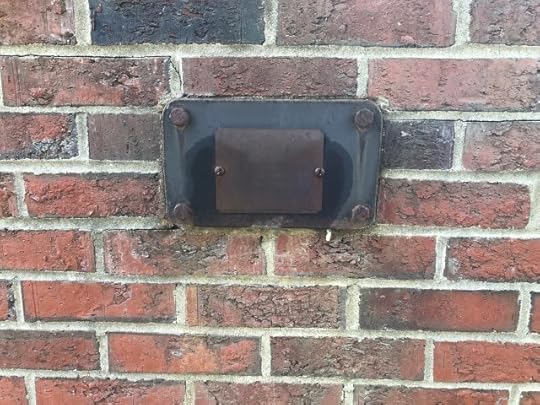
Closeup of the time capsule. Note the super-secure phillips head screws.
Whatever the answer, I find an empty time capsule much more intriguing than one that probably would’ve had a casette tape of Banarama’s Greatest Hits, a pump spray bottle of Love’s Baby Soft and the Harry Hamlin Sexiest Man Alive edition of People magazine.
I’m often asked where writers get their ideas. I have an author event tonight where I betcha I’ll be asked that very question if I don’t beat them to the punch. This right here is it. When I read that email this morning, before all the other questions, the first question in my mind was, “How can I work this into my book?” And I’m not even writing a cozy.
EVENT NOTE: If I amuse you to the point you think you can stand listening to me for an hour or so, I’ll be the guest of Dover, New Hampshire’s, A Freethinker’s Book Store tonight at 7, via Zoom. If you’d like to check it out, register by clicking here.
It’s Win a Book Wednesday!
Kate Flora: Here with a belated good morning and a post about today’s book. Today, some lucky readers who leave a comment will win copies of Steal Away, the domestic suspense book I wrote as Katharine Clark.
some lucky readers who leave a comment will win copies of Steal Away, the domestic suspense book I wrote as Katharine Clark.
In my early years–those first published years that came after my ten years in the unpublished writer’s corner–my writing rhythm was write for nine months and promote for three. Then I got the idea to write a book that was different from my Thea Kozak mysteries, a book better described as suspense than mystery, and one where I first faced the challenge of writing in multiple points of view.
The story is described thusly:
Rachel Stark is about to live every parent’s nightmare: Her nine-year-old son, David, is snatched off the street in broad daylight with no apparent motive and only one clue–his red bicycle lying on the side of the road. Now, already under the strains of a troubled marriage, Rachel must channel every ounce of strength into a desperate search for David.
Into this emotionally charged scene arrive Rachel’s recently divorced sister, a bombshell who conceals explosive secrets; a by-the-book detective, infuriating in his cold detachment; and a deceptive “wait” of the Missing Child Foundation, who harbors his own hidden agenda….
And through it all there is David, still missing and crying out to be found. But are Rachel’s fleeting visions of her terrified child something real or the cruel trick of a mother’s heart consumed with love and fear?
I had the privilege of working with a fabulous editor on this book, one who pushed me hard to make it a better book. I was challenged to make the husband, Stephen, a fuller, less cardboard character, which was difficult because even though I’d created him, I didn’t like him. I had to battle my editor to leave in my vision of the child Rachel and Stephen had lost to a hereditary disease. I got to go to New York and have lunch with the editor, the publisher, and my publicist at a fancy restaurant. And I got one of the most honest responses ever from someone in publishing when I told my editor I was amazed and grateful for how I was treated.
“Ah,” she said, “but we could turn on you at any time.”
I took a lot of big steps in writing this book, both in my craft and in the story, including the important question: could I make Rachel’s psychic connection to David plausible.
There’s a concept called “imagined reality” where the story of the book lives on after the book ends in the reader’s mind. Also in the writer’s. Many years later, I would still like to write a follow-up book, not a mystery but simply fiction, to explore what happened to my characters after the book ended.
Please leave a comment. Maybe you’ll win.
Lea Wait's Blog
- Lea Wait's profile
- 506 followers



